De Duitse dichter en schrijver Thomas Kling werd geboren op 5 juni 1957 in Bingen. Zie ook alle tags voor Thomas Kling op dit blog.
Berliner Totentanz 2
herr doktor – meister der arznei
ich habs euch dreimal schon gesagt:
meint wohl ihr könnt noch länger leben
und wollt euch nicht zu GOtt begeben
stellt ab die probe – verabschiedet euch man
und seht wie gut ich euch vortanzen kann
arzt:
ach gott hier gibts kaum einen rat
der urin sieht schlecht aus in der tat –
die farbe ist schwarz und grün und rot:
ich sehe darin den bitteren tod
in der apotheke gibts nicht ein kraut womit man
gegen den tod was ausrichten kann
Actaeon 3
hirschgulasch. den schuß, widerhallend, gezisch vom lärchenhang,
konnten wir gerade noch hören. wir? bei tisch. der dampfende berg,
gegenüber, gleich drüben, in flußnähe, wo Actaeon zu boden ging.
fetzen. gebeugt in den dampf da, hirschbrocken vom teller. dampf
steigt vom durchwühlten boden auf, staub an der nüster, schweiß.
körper und nadeln. der ganze staub aus der ferne und das dampf-
ende tellergericht, der fluß; motorengeschepper in etwa, von drüben,
so was wie: röhren, plattmachen, turbogeknurr. jetzt wird der luftröhre
ein schnitt gemacht, durchtrennte fährten. Echo erscheint. das frische
mark wird rausgesaugt wie nichts! wir knien so überm hirsch, wir
ziehen uns den rein, wir klärn das mit den toten: ein bildverdampfen
findet statt. den hirsch besäbeln. ächzend. zunge, sehnen. zähne.
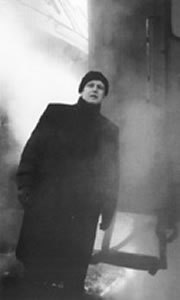
Thomas Kling (5 juni 1957 – 1 april 2005)
De Nederlandse literair criticus Carel Peeters werd geboren in Nijmegen op 5 juni 1944. Zie ook alle tags voor Carel Peeters op dit blog.
Uit: Waarin het geheim van Harry Mulisch te vinden is in de diepte van zijn oppervlakkigheid
“Om te weten waar de allesdoordringende drijfveer vandaan kwam waarmee Harry Mulisch schreef zal men de eerste pagina’s van het hoofdstuk ‘Zelfportret met tulband’ in Voer voor psychologen (1962) moeten lezen. Daar is de ‘oerscène’ te vinden waar alles op terug te voeren is: op de dag dat hij voor zijn vader, na aanvankelijke aarzeling omdat hij nog maar vier jaar was, sigaretten mocht halen. ‘Een opdracht! Ik! Ik!’ Het wordt de opdracht van zijn leven, voor het eerst een zelfstandige daad, helemaal alleen: ‘Ik ben in de wereld, alleen, en van een opdracht voorzien: Lucky Strike! Het licht en het geluid van het asfalt stormen om mij heen, eindeloos zijn naar alle kanten de wegen en dingen, en daar doorheen weet ik mijn weg. Aan mij zal het niet liggen!’.
Wanneer hij met de sigaretten thuiskomt is zijn vader al naar zijn werk vertrokken. Dat valt hem wel op, maar hij staat er niet lang bij stil, overrompeld als hij is door de sensatie van de eerste zelfstandige daad. Dat was inderdaad een ‘lucky strike’. Hij brengt de sigaretten naar zijn moeder en met de tekkel Balda in zijn armen holt hij door het huis, roepend dat hij sigaretten heeft gehaald. ‘Met bonkend hart’ belandt hij tussen zijn speelgoeddieren op de grond van zijn kamer.“
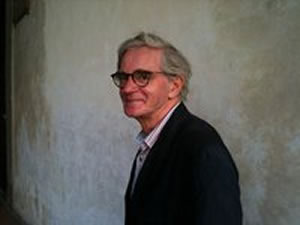
Carel Peeters (Nijmegen, 5 juni 1944)
De Franse feministische schrijfster, dichteres, professor, filosoof, literair criticus en historica Hélène Cixous werd geboren in Oran, Algerije, op 5 juni 1937. Zie ook alle tags voor Hélène Cixous op dit blog.
Uit: The Laugh of Medusa
„…I write this as a woman, towards women. When I say ‘woman,’ I’m speaking of woman in her inevitable struggle against conventional man; and of a universal woman subject who must bring women to their senses and to their meaning in history. But first it must be said that in spite of the enormity of the repression that has kept them in the the “dark” –that dark which people have been trying to make them accept as their attribute– there is, at this time, no general woman, no one typical woman. What they have in common I will say. But what strikes me is the infinite richness of their individual constitutions: you can’t talk about a female sexuality, uniform, homogeneous, classifiable into codes –any more than you can talk about one unconscious resembling another. Women’s imaginary is inexhaustible, like music, painting, writing: their stream of phantasms is incredible.
I have been amazed more than once by a description a woman gave me of a world all their own which she had been secretly haunting since early childhood. A world of searching, the elaboration of knowledge, on the basis of systematic experimentation with the bodily functions, a passionate and precise interrogation of her erotogeneity. This practice, extraordinarily rich and inventive, in particular as concerns masturbation, is prolonged or accompanied by a production of forms, a veritable aesthetic activity, each stage of rapture inscribing a resononant vision, a composition, something beautiful. Beauty will no longer be forbidden.“
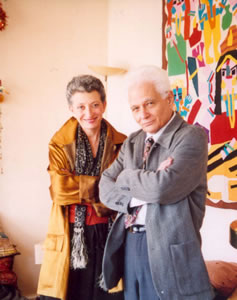
Hélène Cixous (Oran, 5 juni 1937)
Hier met de filosoof Jacques Derrida
De Amerikaanse schrijver en acteur Spalding Gray werd geboren op 5 juni 1941 in Barrington, Rhode Island. Zie ook alle tags voor Spalding Gray op dit blog.
Uit: Over “Sex and Death to the Age 14” (Interview met Karry Kammer)
“I was very naive when I first started doing the book, Sex and Death to the Age 14. I really thought I was going to be able to keep everyone’s actual name as I had in the monologue. Actual names are very important to me really, under the belief that a rose by any other name will smell quite differently. So much is tied up in language and the way we use language. I sent out a form letter to my friends saying, “Dear So-and-So, This is to ask you permission. May I please use your name? I’m writing a personal history about all of us and in no way am I malicious and it’s a kind of record of our lives together. I’m going up to Barrington, Rhode Island.” I got back briefings from their lawyers. Not just polite notes or impolite notes saying, “No, Spuddy, dear, but I’m afraid I’d rather not be a part of your history.” Lawyers sending in two page briefings saying they were going to bring me to court. I was in Australia performing when I got those letters. And I can remember spending hours on the telephone with the Random House lawyer redoing, not only the names, but the situations because you couldn’t have a particular house next to my house because I was naming the town, which most writers don’t do. They call it Winesburg, Ohio, whatever. But since I was keeping my name and the name of the town, it got to be very incriminating. And we went though these enormous, paranoid, convoluted, ridiculous changes to turn it into fiction. And I see that they’ve written fiction on the book. And when I go into bookstores I see it in the fiction section. And I think, “Well, that’s what it’s become because of the changes in the names.” Why it discourages me to change the names is that I am a Cagian, I relate to John Cage, in the sense that I feel there is a certain larger puzzle, larger synchronicity. And I don’t mean this in a schizophrenic paranoid way. But I mean it in the sense that all of culture, all of our culture is an artifact. Nature is the raw and different thing we have chosen to overlay with a sense of order. We make the order. I’m an existentialist to that degree. And because we’re making the order, there are stories constantly created around us, constant puzzles that are coming at us. And I like to be a conduit to those stories.”
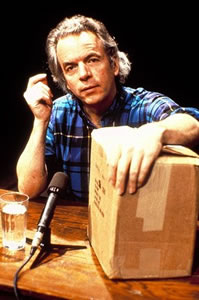
Spalding Gray (5 juni 1941 – 10 januari 2004)
De Ierse dichter, schrijver en schilder Christy Brown werd geboren op 5 juni 1932 in Dublin. Zie ook alle tags voor Christy Brown op dit blog.
In Memory of Melba Our Cat
You did not long enjoy
the unexplored wonders of this other Eden
you of the purring yellow-eyed persuasion
skipping in and so abruptly out of our lives
running rashly off into feline eternity
under the bouncing wheels of a country trailer.
No more than a kitten yourself, girl.
and we who had fumed at your early courting
are thankful now that you gave us as parting gift
three carbon copies of yourself as souvenirs
to help heal the wound of your passing
in a purring concourse of caring.
No more will you wake me from futile dreaming
your velvet presence padding over my face
meowing me back into bleary-eyed reality
wanting not my meagre comfort
but to share your warmth with me
out of the sleek largesse of your nature
The sea will be melancholy for a while
with you not there to distract me
from the due contemplation of beauty
by insisting that I look first upon your own
and for the first time in many weeks
the morning ashes will be undisturbed in the grate
The new home that you had just begun to rule
will be loud now with your sudden absence
until the three gentle reminders you bequeathed us
begin slowly to fill the furry void.
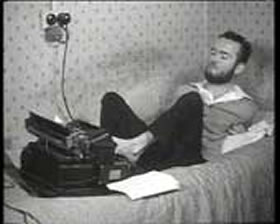
Christy Brown (5 juni 1932 – 6 september 1981)
De Britse schrijver, dramaturg en regisseur David Hare werd geboren op 5 juni 1947 in Sussex. Zie ook alle tags voor David Hare op dit blog.
Uit: Wall: A Monologue
„ll right. Let’s be serious, let’s think about this.
Please, please: consider the state of affairs, consider the desperation, consider the depth of the despair. A country has reached a point at which 84 percent of its people are in favor of building a wall along its borders.
Have you ever known anything of which 84 percent of people were in favor? And yet there it is, over four fifths of a nation—can you imagine that figure?—saying something completely bizarre. The Berlin Wall was built to keep people in. This one, they say, is being built to keep people out.
You might call this an extraordinary state of affairs. Hardly a normal state of affairs. And that’s the word you hear all the time in the Middle East. “Normal.” The Palestinians ask, “When will we have a normal life?” And so do the Israelis. Indeed, the Israeli state was founded in 1948 with the principal ambition of being normal, of being a normal place like any other. The Palestinians call the foundation of the Israeli state the nakbeh: the disaster. And now sixty years later Israel believes itself, in the frequently expressed view of the majority, in need of a wall.
Except, of course, they don’t call it a wall. They call it a fence.“
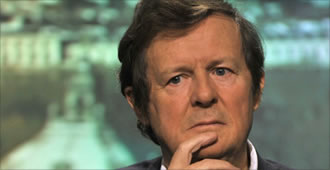
David Hare (Sussex, 5 juni 1947)
De Egyptische schrijfster Alifa Rifaat werd op 5 juni 1930 in Caïro geboren. Zie voor onderstaande schrijfster ook alle tags voor Ailfa Rifaat op dit blog.
Uit: My World of the Unknown
“I felt her as she slipped between the covers, then her two tiny fangs, like two pearls, began to caress my body; arriving at my thighs, the golden tongue, like an arak twig, inserted its pronged tip between them and began sipping and exhaling; sipping the poisons of my desire and exhaling the nectar of my ecstasy, till my hwole body tingled and started to shake in sharp, painful, rapurous spasms – and all the while the tenderest of words were whispered to me as I confided to her all my longings. .”

Alifa Rifaat (5 juni 1930 – ? 1996)
Caïro
Zie voor onderstaande schrijvers ook mijn blog van 5 juni 2009.
De Zwitserse schrijver en uitgever Otto Friedrich Walter werd geboren op 5 juni 1928 in Rickenbach.
De Engelse schrijfster Ivy Compton-Burnett werd geboren op 5 juni 1884.
